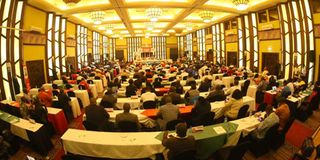Omondi a good addition to FKF’s executive council

Delegates during the Football Kenya Federation elections held at Safari Park Hotel, Nairobi on October 17, 2020.
What you need to know:
- The dynamics around decision making at NEC are certainly complex, but it would help if there are mechanisms to assist Omondi and all the other elected women in making decisions alongside their male counterparts.
- Kenyan female footballers are constantly given far fewer resources than men in terms of equipment, facilities, funding, coaching, sponsorship and media exposure, and this needs to stop.
Divisive and controversial as they were, there is a silver lining in the recently concluded Football Kenya Federation (FKF) elections. A woman will sit in the FKF National Executive Council (NEC).
Not that women were missing out on the air conditioned board rooms and the soft leather seats, or that they were in desperate need of the hefty perks and allowances that the NEC members usually pocket.
In an industry that for decades has been dominated on the field and in the boardroom by men, this is a feat worth celebrating. Women’s voices were evidently absent at FKF’s national decision making organ.
The lot has fallen on Margaret Omondi, a retired Fifa referee, to represent the hundreds of thousands of footballers who are female. Margaret beat her competitors Violet Kerubo and Sally Bolo in unthinkable fashion to clinch the newly-created Woman Representative seat at the NEC.
She defeated her closest rival by only one vote, but she won despite poor fundraising, little media traction and no base of wild enthusiasts.
Now, as she gets her feet properly under the table, one hopes that she understands her role as the first person to occupy that seat.
What Kenyan football enthusiasts want from her is just a helping hand, to make the fight against gender inequality in football easier. To give female footballers a platform to stand on, so that they could reach higher.
Her primary task is to elevate women’s football at a time Kenya and the East Africa region is benefiting from grants worth millions of shillings from Fifa for the same purpose.
Being a certified referee, Omondi should know that despite Harambee Starlets’ qualification to the 2016 Africa Women Cup of Nations and a consistent run in the qualification campaign for the 2020 Olympics, women’s football in Kenya has suffered greatly owing to inadequate funding from the federation, government and the corporate world.
The Women Premier League is on its knees, literally, with players going for months without pay after being forced to play in unsightly, dangerous pitches.
Kenyan female footballers are constantly given far fewer resources than men in terms of equipment, facilities, funding, coaching, sponsorship and media exposure, and this needs to stop.
And because she is no stranger in the industry, I hope she has the temerity to withstand and neuter any attempts to be silenced or cajoled into making imprudent decisions by the powers that be.
There are fears that Omondi is a token leader, planted by the current regime so that they can have a freer hand in controlling millions of shillings in grants from Fifa. If this is true, then the fight for a better future for our female footballers has already been lost.
The dynamics around decision making at NEC are certainly complex, but it would help if there are mechanisms to assist Omondi and all the other elected women in making decisions alongside their male counterparts.
This is deeply lacking at Goal Project, and is the reason Doris Petra has failed so terribly at advocating for women’s football despite occupying the second most powerful seat in the NEC. Before Petra, there was Angeline Mwikali who served as Woman Representative for Eastern Region.
Time will tell what legacy Omondi leaves behind, but there is no doubt that only when there is a level of understanding and cooperation between Omondi and her male counterparts can she achieve success.




